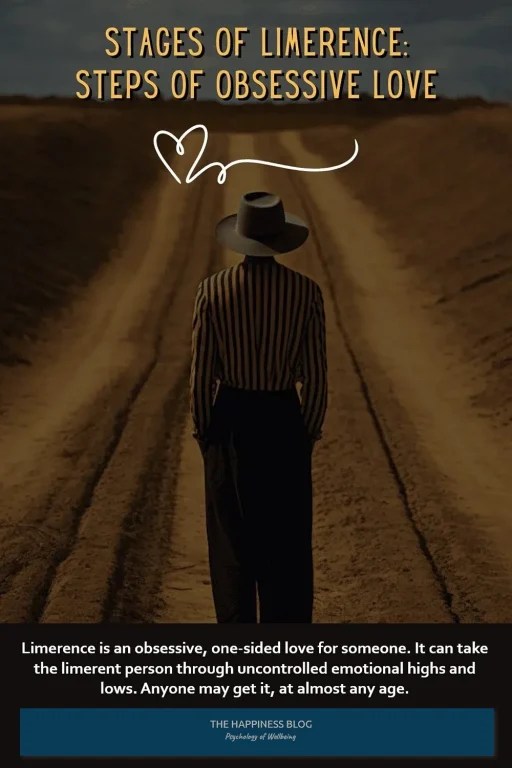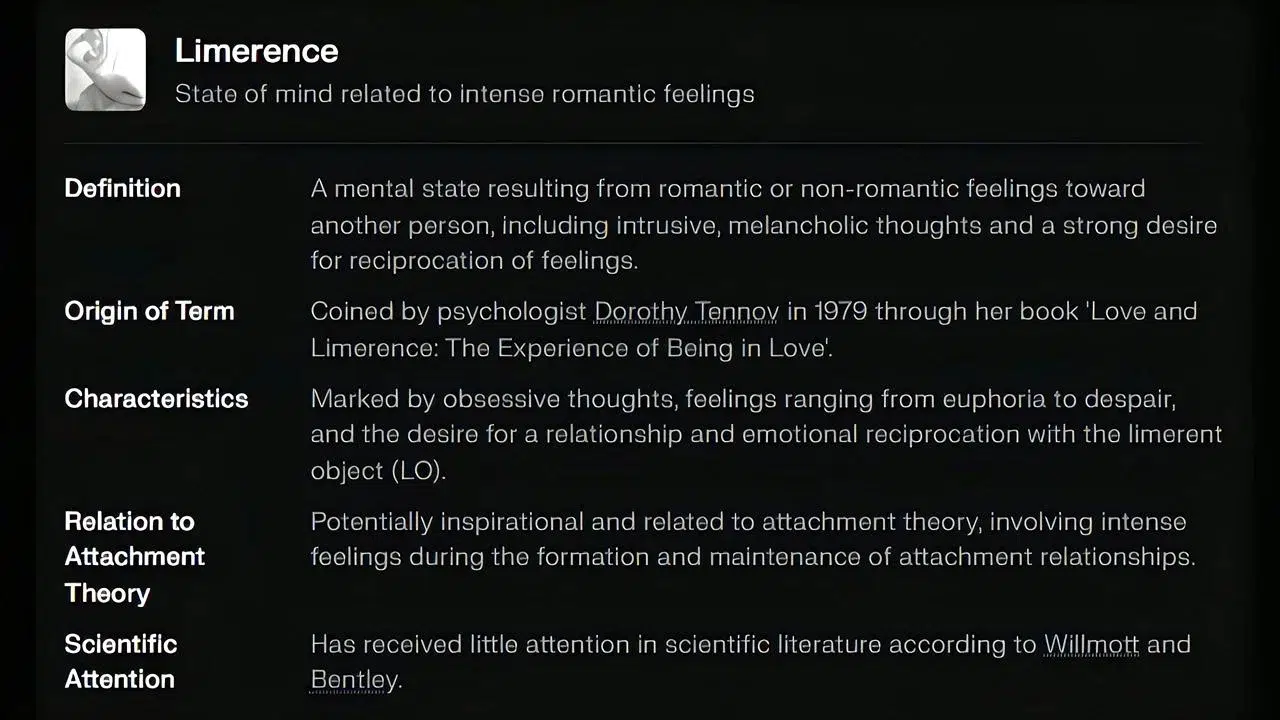Today's Saturday • 7 mins read
Limerence is an obsessive attraction and deep longing for someone.
It sounds like a crush, infatuation, love-sickness, or even early-stage love. But those who went through it understand how ‘supercharged’ it is.
The emotions of limerence are intense, swinging between extremes: exhilaration and exhaustion, excitement and anxiety, elation and shame.
This is a force of nature that is not backed by logical reasoning, but rather a wild and unrestrained desire to start a relationship.
Limerence goes through stages. Some researchers say there are only three stages, while others suggest as many as seven.
We discuss two of them: one by Johan Verhulst and the other as a popular one.
Verhulst’s 5 Stages of Limerence
Verhulst (1984) concluded after reading Tennov’s work that there were five stages of limerence:
Stage 1: Pre-limerence
In this, the person is actively longing for love.
Their readiness makes them feel attracted to several people. But they have not yet chosen a specific person as their target of love, called a Limerent Object (LO).
The strong desire to receive love drives limerence.
The moment they sense any sign of reciprocation of interest, they pick their LO.

Stage 2: Pre-reciprocity
The Limerent Individual (LI) develops a quick, strong interest in their target person.
Physical attraction might not happen right away, though the desire to be intimately active exists.
The LI sends subtle, non-verbal signs of attraction to the LO.
- If the LO rejects these signs, the LI feels deep sadness that slowly fades, and leads to new limerence.
- If the LO doesn’t clearly reject the limerent’s interest, the LI sees this as mutual reciprocation.
Stage 3: Reciprocity
When your target person reciprocates your feelings of love, or shows interest in you, you enter a phase of intense obsession.
This is the most desired and rewarding stage of limerence, and can last days, months, or even years.
Reciprocity, even slight interest from the target person, can bring intense joy and excitement, driven by the release of dopamine and norepinephrine in your brain.
You have trouble focusing on anything else. You have a strong desire to spend all your time with them and are constantly thinking about your next meeting. Some other effects seen:
- Appetite might change
- Sleep patterns become abnormal
- Other relationships might feel less important
- Time seems to move differently when you’re with them
Some experts feel this stage has features of obsessive-compulsive patterns. You might check your phone constantly or replay conversations in your head. These behaviors are automatic and uncontrollable.
The reciprocity stage is the most wonderful phase of the entire limerence experience, but it eventually fades. Why?
Because limerence needs two ingredients to sustain: hope and uncertainty.
- Hope comes from believing that they like you back.
- Uncertainty comes from not being completely sure about their feelings.
When both people feel love (mutual limerence), uncertainty decreases. This makes the intense feelings dissolve faster.
Stage 4: Gradual dissolution
When the intensity of limerence weakens or disappears, anxiety often takes its place.
This can result in a range of responses, from the limerent person blaming others to having strong feelings of being deceived.
Some limerents may cling to the idea of limerence and try to re-establish those feelings when the original limerence has dissolved. This can result in distress and despair.
However, if neither person is responsible for the end of limerence, they might be able to build a healthy relationship.
Stage 5: Post-limerence
This is a stage when no trace of limerence remains in the relationship.
It allows for a strong, healthy attachment. The communication in the relationship becomes two-way as well.
The stage of post-limerence is rare after the previous stage of gradual dissolution.
Few people get to this stage because of the highly emotional and dispute-driven state involved in limerence.
Mostly, individuals deliberately return to a pre-limerence state and actively search for a new LO.
Popular 4 Stages of Limerence
Stage 1: Crush
In the crush stage, you start to feel increasingly attracted to this special person.
You feel a rush of excitement when you see them or talk to them. You steal glances at them from across the room, often lovingly sighing when they do a simple gesture, like smiling or laughing.
Your heart races at the mere thought of them. Their presence lights you up and makes you anxious to get close to them.
The emotions in the crush stage could be:
- Euphoria, excitement
- Nervousness, anxiousness
- Increased energy and motivation
- Obsessive thoughts and daydreaming
Advice: Your best course of action at this stage would be to enjoy the excitement and get to know the person, without letting your feelings get out of control.
[Are you aware of these limerence triggers?]
Stage 2: Infatuation
The second stage of limerence is infatuation. This is when your feelings of attraction intensify.
You put them on a pedestal, overlooking all their flaws. You think they’re perfect and ideal in every way, and start to feel like you can’t live without them.
It seems impossible to stop thinking about them. Your daydreams surrounding them start to interfere with your sleep and work.
You become very sensitive, often getting angry or tearful or otherwise emotional at the slightest indifference or hint of rejection from them.
Some emotions you might experience during this stage include:
- Intense longing and craving
- Increased anxiety and insecurity
- Fear of rejection or abandonment
- Restlessness and insomnia (sleeplessness)
- Fantasizing about a future together with this person
Advice: During this stage, be mindful that your emotions are not entirely rational. Talk to someone you trust to figure out if your feelings are based on reality or just your imagination.
Stage 3: Frustration
The third stage of limerence is frustration. This is when reality starts to set in.
You realize that the person you fell for does not feel the same way about you. Despite your subtle and obvious signals, they are not ready to reciprocate your feelings.
You start to feel rejected.
A feeling of disappointment, grief, and even anger develops. Strangely, most of it is directed at the person you love.
This is a painful time, when you might slip into mild depression. You may show loss of interest in activities you once enjoyed, difficulty concentrating, changes in sleep patterns, and have feelings of sadness or hopelessness.
Some emotions you might experience during this stage include:
- Frustration, apathy
- Anger, bitterness, revenge
- Sadness, loneliness, mild depression
- Obsessive thoughts and constant rumination
- Low self-esteem and feelings of inadequacy
Advice: During this time, practice taking care of yourself, even if you don’t feel like it. Talk to a counselor if you feel inadequate or worthless, or think destructive thoughts.
Stage 4: Resignation
The fourth and final stage of limerence is resignation. This is when you start to accept the reality of the situation.
You might still feel some residual feelings of attraction, but they’re no longer overpowering and don’t consume your thoughts.
Some emotions during this stage include:
- Relief, sense of freedom
- Acceptance and detachment
- Gratitude for the experience
- Increased self-awareness and emotional maturity
Advice: During this stage, reflect on the experience and write down what you learned from it. And do not jump into another new limerence.
Science of Limerence
The term “limerence” was coined by psychologist Dorothy Tennov in 1979. She called the person having limerence a Limerent Individual (LI), and the target person a Limerent Object (LO).
Later research on limerence found that:
- Feelings of limerence can persist for years, become addictive, and develop into obsessive rumination fed by both doubt and hope (McCracken 2024).
- High levels of limerence include contrasting emotions from extreme joy to complete despair, and fluctuate with interpretations of rejection or reciprocation (Tennov 1998; Banker 2010).
- Effects of limerence can be devastating, and include symptoms of depression, attachment anxiety, post-traumatic stress disorder, self-injury, stalking, and breakdown of existing relationships (Willmott and Bentley 2015).

Final Words
The stages of limerence can be a wild ride of emotions, from the initial crush to the final resignation.
But what happens if limerence is reciprocated?
Typically, limerence is founded on unrequited love. The unobtainable nature of the goal is what makes limerence. If the love is reciprocated, then it stops being limerence.
And changes into a possibility of healthy love.
√ Also Read: Love & Limerence: How They Are Different
√ Please share this with someone.
» You deserve happiness! Choosing therapy could be your best decision.
...
• Disclosure: Buying via our links earns us a small commission.